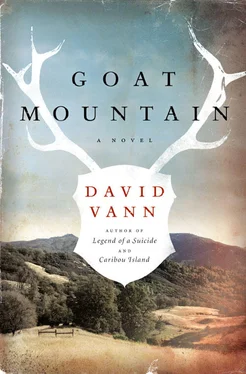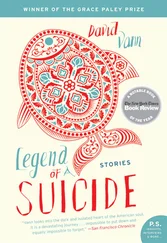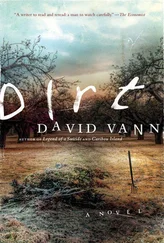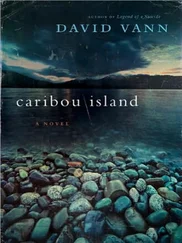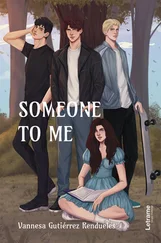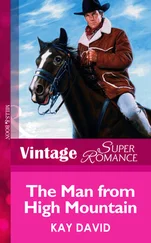Walking in a void. The truth of every landscape. When the promise of killing is taken away, the brush is without name, a dozen varieties but all of it dry and reaching upward and compact and unforgiving, grown too close and shortening all escape. The sky new and old and nothing, and the earth insubstantial. We walk on because that’s all that’s left.
My hands were empty, no rifle. What’s good is to hold the grip of a rifle and let the barrel go over a shoulder. The weight of that cutting a crease along your neck. The swing of it as you step, the burden and the heat still in that barrel. And in higher brush, to hook your other hand over the barrel and carry that rifle on both shoulders. You become a giant when you hold a rifle like that. The distance from your shoulders down to the ground increases, and you can wade through any brush and never be held back. And you’re still watching for movement to both sides. In an instant, you could bring that rifle down and fire. One foot would be back for balance, but you’d never have thought to put it there. And even if you never find movement and never bring the rifle to bear, still it’s the two of you walking in that void, and the night as it closes in feels companionable.
But with no rifle, the air is only air, and it’s impossible to know what to do with your hands. Arms up to fend against brush but the hands themselves useless, and the brush grown tall, and no bearing available, one’s track winding like a snake’s. Buried in brush, and all of it endless, and each step a struggle.
I tore through enormous stands of poison oak and finally was clear to cross that more open wasteland, too dark to see the truck but light enough still to find my way, everything timed to the light from before I was born, and my feet timed, also, and my breath and my blood and even my thoughts, which were of nothing.
We stood around that pickup looking at the ground or the sky.
Too dark to track, my father finally said. But we’ll get him tomorrow.
Been a long time since we’ve gone down through there, Tom said.
Years, my father said. More than that.
Might be nothing down there.
Might be. We can decide in the morning. See how things look.
The four of us darker presences in that night, which had become cold already. The air too thin to hold heat once the sun was gone, but somehow it held still the barest bit of light. Enough to tell that my father and Tom both held their rifles in the crooks of their arms, barrels pointed down. My grandfather’s on a strap on his shoulder. A shadow in darkness can move anywhere, and as I blinked or shifted my glance, the men would veer closer or fall away.
Might be nothing at all down there, Tom said.
Might be, my father said. But we’ve seen one.
He says we’ve seen one. Did you see one, or any sign of one?
No, my father said.
He was a big buck, I said.
We heard that, Tom said. Outlined in sun, I’m guessing. All ablaze. Every point on fire, and leaping fast through all that crap.
Yeah, I said.
And disappearing just as we looked that way.
Yeah.
Okay, my father said. That’s enough.
We’ve never seen a big buck this close to camp, Tom said.
Doesn’t mean we didn’t see one now, my father said.
How many years? Tom asked.
Bats were flying over, pieces of the night come loose and diving down between us. No sound of their wings.
What happens now doesn’t owe anything to what happened before, my grandfather said.
Yes it does, Tom said.
And what from before told us he would shoot that poacher?
That’s not the same.
Sure it is.
The cold sinking down over us. The way we’d stood many times, gathered around the pickup in darkness at the end of a hunt, except there was no smell of sulfur. That was missing.
That buck could be there or not be there, my grandfather said. You have no idea which it is.
It’s getting cold, my father said. Time to get back to camp.
All three of you have gone crazy, Tom said. All three of you.
My father opened the driver’s door and the light came on. The only light on that entire mountainside, and my father’s thin hair as he tilted in. Then Tom scooting into the center with his rifle barrel leaned back against his shoulder, and then my grandfather.
I sat down in the bed, kept low against the cold as the truck twisted and the four-wheel drive moaned, and we were back in camp quickly.
My father fired up the lantern first thing, pumping at it in darkness and then lighting the wicks, like tea bags on fire, and then the flames sucked in and grew white-hot as he opened the valve more, the sound of a furnace, a soft roar.
He set this near the griddle and then made a fire in the pit just before the table. Big Blue Tip kitchen matches and newspaper, smaller sticks and then the split wood he had brought. We sat on log rounds as Tom worked on dinner. The fire grown and the heat coming off it, the three of us leaning in as close as we could. The sparks lifting up into the pines. The fire setting us apart from all else. The first thing to distinguish man. Hunting in a group was older but shared by animals.
There’s not much we can do that is older and more human than sitting at a fire. The way a flame surrounds a piece of wood and illuminates, how soft that flame looks, and how it seems nothing at all will happen to the wood. Blond still beneath, visible through flame, and the transformation to black is something unnoticed until it’s already done.
No edge of a flame ever breaks or tears. It can take any shape at all, but every change is fluid, every edge rounded, each new wave born of the last and complete and vanished. It’s only in fire or water that we can find a corollary to felt mystery, a face to who we might be, but fire is the more immediate. In fire, we never feel alone. Fire is our first god.
We could hunt the glades tomorrow, my grandfather said.
We should go back for that buck, my father said.
You know there’s no buck, my grandfather said.
Three generations of us staring into that fire, into the first coals, radiating orange, a deeper color to the heat. The wood organizing itself as it was consumed, segmenting into rectangular coals. And where did this order come from?
You don’t know that, my father finally said.
What I know is that he’s not right, my grandfather said. Something in him is not right. And what we should be doing is killing him right now and burning him in this fire.
You’re talking about my son, my father said. Your grandson.
That’s why we should be the ones to take care of it.
Neither of them were looking at me. They spoke about me as if I were a million miles away.
I’d kill you first, my father said.
I know that, my grandfather said.
In firelight, their faces two versions of the same, separated only by time. Same eyes staring down into the coals, same hands outstretched, only the surface different. Older skin, and my grandfather swollen and infirm. But if you could cut away the fat, go back in years, you’d find the same man.
What I can’t remember is what I understood. I know my own grandfather said I should be killed and burned, but I can’t remember what I felt when he said that. I think I felt nothing, because I remember nothing. Anger might have been possible. When there’s no understanding, anger is always possible. But I could not have felt any recognition, and for some reason I don’t understand now, I felt no fear.
With every moment, things are getting worse for us, my grandfather said. Every minute that passes. That body hanging is like a clock.
That’s true, Tom said. His voice from outside, unwelcome. The smell of steaks and onions on the griddle, popping of grease just audible beyond the drier sounds of our fire.
Читать дальше
